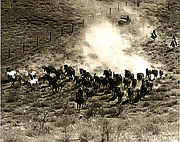The Moses Lake Roundup, 75 years in the making
Editor's note: This is the first in a Columbia Basin Herald exclusive three-part series on the rich history of the Moses Lake Roundup and its tribute to western heritage. Herald staffer Rodney Harwood sat down with longtime Moses Lake Roundup committee members Mick Hansen, Bill West, Paul Kersey and Larry Schwab to talk about the Moses Lake Roundup, which is now 75 years in the making.
MOSES LAKE — Nothing captures the spirit of the American Frontier like the sound of thundering hooves. Even though the days of the wild mustang on the open prairie have given way to internet, cell phone towers and the 21st century, they are not forgotten here in Rodeo Country, where the pavement ends and the West begins.
The Moses Lake Roundup, rich in tradition and history, is celebrating 75 years of bringing world-class rodeo and western heritage to the Columbia Basin. The action begins Aug. 15 with the demolition derby, then shifts into three days of rodeo Aug. 16-18 at the Grant County Fairgrounds.
But even before the Moses Lake Roundup was named the PRCA Large Rodeo of the Year (2013), or the Small Rodeo of the Year (2011); before longtime Cheyenne Frontier Days stock contractor Harry Vold used to bring his world-class bucking stock; or George cowboy Wade Leslie, the only man to post a 100-point bull ride in rodeo history, competed here; or actor Dan Blocker (Hoss Cartwright on television series Bonanza) helped generate enough money to build the new arena, the Moses Lake Roundup synonymous with the sound of the thundering herd.
“Way back in the early '40s, they used to round up all buckin' horses over here off of Crab Creek and the Sand Dunes. The ranchers would bring in their calves and steers, but the horses used to run wild between here and Ephrata,” said longtime Moses Lake resident Bob Ottmar, who's seen 'em all since 1943.
And that's where our story begins, bringing in the herd and listening to the stories of those with ties to the humble beginnings of a world-class rodeo.
“I remember going out in one of the Jeeps and helping round up the horses,” said past president Mick Hansen. “We didn't have the four-wheelers (all-terrain vehicles) at that point in time. There were no roads or anything, we just drove across the open prairie going after these horses.
“I remember one time we hit something and lost the front passenger seat. The final year (1953) Time Magazine sent a crew out to do a story. They had people on the ground and people in the air to see us round up the horses.”
The bloodlines on some of these mustangs date back to the time of the Spanish inquisition when horses were imported from Barcelona to supply the needs of armored cavalry. Their history dates back to the 1600s when Indians living in the New Mexico City of Oñate overwhelmed their Spanish overlords, releasing thousands of horses into the hands of Pueblo, Apache, and Navajo nations. From that point forward, the horses ran wild for centuries.
“It's not like herding cattle,” said Bill West, whose father was a longtime arena announcer. “They want to scatter and try to break loose. We brought them in on the lower end (of town) and headed over to Bob Goodwin's corrals.”
Said Larry Schwab, a committee member who is headed into his 37th rodeo, “I remember my father-in-law saying they swam them across the lake near Cascade Valley and then up the hill to a corral,” he said. “Of course, Moses Lake wasn't as deep or high as it is now. The water didn't come in until 1951.”
These wild horses from the prairie pale in comparison to today's modern-day, world-class bucking stock, but what they didn't have in competitive athleticism, they made up for with the wild spirit of the West.
“Most of ‘em wouldn't buck. You climb on them and they'd take off running across the arena scared to death,” said past committee president Paul Kersey. “They'd have to go through and pick out the ones that would buck to put on the show and turn the others loose.”
See Thursday's Columbia Basin Herald for the second in this three-part exclusive series on the 75th Annual Moses Lake Roundup.



